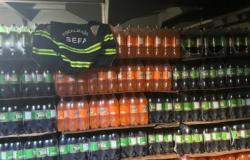The brand Starbucks Brazil it could even change hands soon. ZAMP, which also operates the Burger King and Popeyes chains in Brazil, took the first official step to also own the coffee shop chain here.
The non-binding offer is a step that precedes the acquisition of a company. In it, the interested company evaluates the information about the business, checks the necessary authorizations for the acquisition and, confirming interest, presents a final offer for signing the contract.
Now, the due diligence process serves to understand the operation’s accounts and whether it is possible to take advantage of the assets that SouthRock already has so that the brand can begin operating under a new owner.
Although the terms of ZAMP’s proposal to SouthRock are confidential, the g1 spoke with experts who gave some clues as to what the market can expect from this business.
In this report, you will see:
- What is a non-binding offer
- The differences for a company undergoing judicial recovery
- What are your expectations for the next steps?
- What does ZAMP say
- The operation of Starbucks in Brazil
- SouthRock’s judicial recovery
What is a non-binding offer
A non-binding offer is a type of official letter of interest during a possible merger or acquisition process. In the acronym in English, it is called NBO (Non Binding Offer).
Through this document, the company interested in acquiring certain assets or the entire operation of a company presents its desire to make the purchase and requests, in return, more information about the business, so that due diligence can be carried out.
“Making a parallel with our daily lives, it’s like negotiating the purchase of a property. You sign a purchase and sale agreement, and ask to see the documents. The contract comes out if all these documents follow the conditions of the buyer, how everything is regulated, without protests”, explains Nelson Bandeira, a lawyer specializing in corporate finance at the mergers and acquisitions consultancy Magma.
In the corporate world, these conditions can vary greatly from business to business, but Bandeira highlights points such as what are the debts of the company to be purchased and the financial results of operations, to understand whether that purchase has the potential for good returns.
A non-binding offer may or may not include an estimated price and payment method, depending on what is required by the parties involved in the negotiation.
In general, This type of offer does not create an obligation to complete the purchaseeven if all the criteria required by the potential buyer are met by the seller, highlights Joyl Gondim, partner in the mergers and acquisitions area at Demarest Advogados.
However, each proposal may have its own particularities, so that the parties can try to protect themselves in court if the deal does not go ahead.
The experts consulted by the g1 explain that, in a case like that of Starbucks Brasil, which involves large companies and is highly publicized, there is a possibility that the companies have signed an exclusive negotiation agreement.
In this case, SouthRock would undertake to negotiate the sale of the Starbucks operation only with ZAMP during a period determined by the document. Bandeira highlights that, in situations like this, it is common for the offer to also stipulate rules and fines.
“The seller undertakes to give exclusivity to the potential buyer for a certain period, under the risk of paying compensation if the agreement is broken. The other party, even with due diligence showing that everything is ok and within the established criteria, decides not to buy, you may have to pay a fine. Everything will depend on what is proposed in the offer”, comments the expert.
In a more competitive scenario, with companies out of judicial recovery, for example, Gondim, from Demarest, states that it is common for several interested companies to present non-binding offers and that, during the due diligence processes, the selling company itself has to choose among potential buyers.
“It is possible that several groups are running in parallel in a dispute to see who will make the best offer. The main criterion is financial, but it is not just about who pays more. There are other relevant conditions, such as payment method or a possible price retention, for example”, says Gondim.
Will Starbucks close? Understand the brand crisis in Brazil
The differences for a company undergoing judicial recovery
When the company is in judicial recovery, due diligence must also involve approval from creditors.
Nelson Bandeira, from Magma, points out that the sale of the Starbucks operation is part of the payment of SouthRock’s debts in the recovery process, regardless of the class of debt (whether labor debts or debts with financial institutions, for example).
Therefore, one of the requirements to be met by the company undergoing judicial recovery is to obtain approval from the creditors in court for the possible movement of the business.
“When you have an offer like this within a judicial recovery, the company will have to go through the process, speak to the judge and the committee of creditors so that they also approve this possible sale. This will be part of the judicial recovery plan” , says Bandeira.
Experts explain that creditors may oppose a possible sale if they consider that the business is not financially interesting.
Another noteworthy point is that, in a judicial recovery, negotiation during the non-binding offer stage You can leave a large part of the transaction’s debts (or liabilities) with the selling company.
In general, when there is no recovery, it is common for the purchase to involve both the company’s assets and liabilities.
In the case of Starbucks, Joyl Gondim, from Demarest, highlights that authorization for a possible transaction must also go through the company’s headquarters abroad.
Number of companies in judicial recovery increases in the country
What are your expectations for the next steps?
Even without the obligation to purchase through a non-binding offer, analysts’ expectations for the Starbucks case are that negotiations should move forward. It is enough for ZAMP’s due diligence to confirm the numbers and there are no impediments.
There is no rule that determines how long a non-binding offer will last, but experts say that issues usually resolve themselves, on average, between 90 and 180 days.
If ZAMP decides to proceed with the purchase, the next step will be to present a binding offer, which is the final proposal, with values, payment method and other conditions agreed between the companies.
“In the non-binding offer, the company will set an expectation of value and how the process would be conducted, based on estimates available in the market”, points out Gondim. Only after all the checks has the potential buyer hammered down on the price she agrees to pay.
If they reach an agreement, ZAMP and SouthRock must sign a contract and then the Starbucks operation in Brazil would come under the control of the owner of Burger King and Popeyes in the country.
The information about the non-binding offer to SouthRock was confirmed by ZAMP in a statement to the market.
“The Company will initiate due diligence on the Starbucks Brasil Assets in order to confirm its interest in the acquisition of said assets and present a binding offer,” said ZAMP, in a note.
“The parties committed to making efforts, if the Company presents a binding proposal, to negotiate and execute definitive documents detailing the terms and conditions of the acquisition of Starbucks Brazil Assets, which will be subject to judicial recovery procedures, in accordance with the law and to the execution of definitive contracts with Starbucks Corporation, in addition to other suspensive conditions usual in operations of this nature”, concludes the company.
O g1 reached out to ZAMP for more information on the matter, but the company said it is in a silent period and will not comment.
The operation of Starbucks in Brazil
SouthRock, which also operates Subway and Eataly, lost the right to use the Starbucks brand.
In its initial request for judicial recovery, SouthRock stated that the continuity of Starbucks’ operations in the country would be essential for the maintenance of the group’s activities and its restructuring. Therefore, he requested the suspension of the termination of the contract with the head office.
The court, however, did not accept the request.
SouthRock judicial recovery
According to SouthRock itself, the situation had been deteriorating since 2020, the first year of the Covid-19 pandemic. That year, the group’s sales plummeted by 95%, followed by a drop of 70% in 2021 and 30% in 2022.
The company said that its operations were hampered, among other things, by the high instability in the country, interest rate volatility and constant exchange rate variations.
“Which is why the full restoration of its cash flow has not yet been achieved,” wrote the company in the recovery document. “This was the scenario that, regrettably, generated this unprecedented crisis for the company after the state of public calamity was established.”
Tags: Starbucks Brasil understand steps purchasing coffee chain Business
--





